New Babylon
Anna van Buerenplein 41
2595 DA The Hague
Contactdetails
Phone: +31 (0)70 2196890
Email: info@nexstep.nl
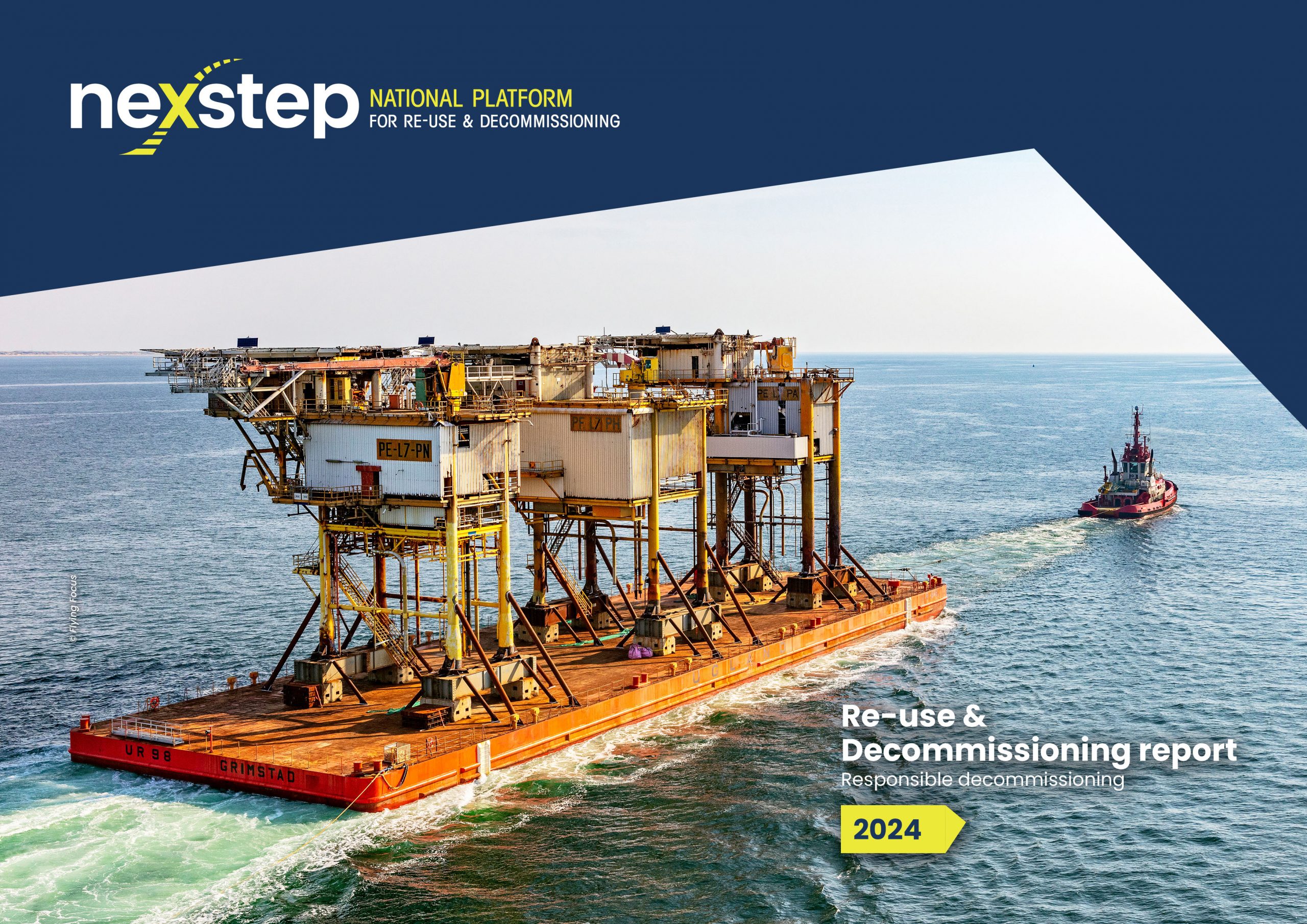
Each year, Nexstep reports the progress in and a forward look on the decommissioning of oil and gas infrastructure in the Netherlands. Just like last year, this year has seen an increased volume of dismantling activities, both onshore and offshore. In 2023, eight offshore platforms were dismantled completely, and a further three almost entirely (except the jackets). The oil and gas operators are expected to decommission around 60% of the infrastructure over the next ten years. This report also highlights the rising costs, the shortages on the labour market and the slow rate of progress in terms of innovation. All three may prove a challenge to the optimum decommissioning process for the coming years.
To counter these trends, smart, creative and effective solutions will be needed. Examples include the new contracting strategy for the clearing of all onshore locations as developed by NAM, and a new technique for the removal of onshore pipelines as used by operator Kistos. In addition, joint campaigns and the standardisation of regulations across the whole (southern) North Sea can contribute to maintaining the pace of decommissioning and cutting costs. Together with operators, Nexstep is performing technical qualifications to facilitate the introduction of new and better techniques. For example, Through Tube Cementing, a method for plugging wells without having to employ a drilling rig.
More than 70% of the costs for decommissioning the Dutch oil and gas infrastructure are borne by the Treasury. This fact underlines the importance of cost cutting. At the same time, intensified use of the limited space in the North Sea will oblige us to improve the quality of the ecosystem. Nature-friendly dismantling may offer opportunities in this respect, which we are currently investigating. Read more about these and other developments in our report for 2024: Responsible decommissioning, now and in the future!
Re-use & Decommissioning rapport 2024 ENG
The abatement of summer storm Poly in the afternoon of 5th July removed the final obstacle to the presentation of the annual Re-use & Decommissioning report. Thijs Starink, General Manager of Nexstep, symbolically handed over the online report to Sybilla Dekker, chair of the North Sea Consultation.
The title of this year’s Nexstep report, “Stepping up the pace”, reflects the acceleration of the decommissioning activities in the Netherlands, in 2022. In his word of welcome, Starink explained his motivation for continuing to accelerate decommissioning, wherever possible in a more eco-friendly and futureproof manner. “I have been employed in the oil and gas industry since 1986. It is both fitting and a great honour to be able to contribute to the re-use and optimum decommissioning of the oil and gas infrastructure. We are also investigating opportunities for more innovative and eco-friendly dismantling.’
Importance of cooperation
After taking receipt of the Nexstep report, as chair of the North Sea Consultation, Sybilla Dekker reflected on the cooperation between the parties involved in decommissioning. As she put it, “I recognise how important it is that all stakeholders, including those monitoring effects on the North Sea, engage in dialogue. It is by no means self-evident for organisations of such different kinds to join forces – and yet that is precisely what is happening here. As such, Nexstep is actively demonstrating the vital importance of working together, despite differing roles and interests, as the key to achieving more than operating individually. The Nexstep report is a reflection of the different approaches that emerge from those differing roles. And that is particularly pleasing to me in my role as chair of the North Sea Consultation.
Panel discussion
Acceleration of decommissioning activities, eco-friendly dismantling and the legislation and regulations governing the decommissioning process were three of the core subjects discussed by the panel, following the presentation of the report. During those discussions, Caroline van Dalen, MT member Deep Subsoil Transition at the Ministry of Economic Affairs and Climate Policy emphasised the societal importance of efficient and effective removal operations as well as conducting studies into the re-use of infrastructure for example for CO₂ and hydrogen storage. Boukje van der Lecq, director Licences at State Supervision of Mines, underlined the importance of good cooperation between all stakeholders, and of safety for both people and the environment during the decommissioning process. Arendo Schreurs, director of Element NL, called for greater clarity in the application of current legislation and regulations. Heleen Vollers, Senior Project Lead Eco-friendly Offshore Energy at the North Sea Foundation, expressed her pleasure at the growing attention for the condition of the North Sea, and the willingness of the various stakeholders to investigate the value of ecological hotspots that have appeared around the hard structures on the seabed.
Shared conclusions
Everyone involved has seen how the pace of the decommissioning activities has been stepped up. Cooperation within Nexstep has indeed resulted in cost savings and a better understanding of the decommissioning processes. At the same time, evidence from practice reflects the need for greater clarity and predictability in (the application of) legislation and regulations. Sound dialogue between all parties is a valuable tool when it comes to developing additional consideration frameworks and guidelines. All parties recognise that healthy nature and biodiversity are key factors in satisfying the commonly shared desire.
“Stepping up the pace” is the sixth annual Re-use & Decommissioning report by Nexstep. The report was presented at Campus@Sea in The Hague. The goal of Campus@Sea is to promote joint innovation for the sustainable, multiple use of the North Sea.
The optimisation of decommissioning activities, intensive cooperation between operators and innovative projects; the sixth Re-use & Decommissioning report reveals the impact of Nexstep in these and other policy areas. Also thanks to the facilitating role of Nexstep in the cooperation and exchange of knowledge between operators, the Ministry of Economic Affairs and Climate Policy and other stakeholders, there has been huge growth in decommissioning activities since 2022. Against that background, the subtitle for this year’s Nexstep report is ‘Stepping up the pace’.
Maintaining the high pace of the decommissioning process at a structural level and preparing for the reuse of infrastructure require clear regulation. Kees Hansma, Director Deep Subsoil Transition at the Ministry of Economic Affairs and Climate Policy, describes in the report the latest legislation and regulations and the conditions that could be influential in the future.
Taking the next step goes hand in hand with monitoring recent developments and moving forward based on the latest insights, for example the current attention for nature-friendly decommissioning. Inspired by the North Sea Agreement and results of studies by Wageningen University & Research, earlier this year, Nexstep joined forces with Element NL, the North Sea Foundation and NWEA, and signed up to a joint project headed by Energie Beheer Nederland (EBN). Read all about this and other innovative developments in the new report.
Re-use & Decommissioning rapport 2023 ENG
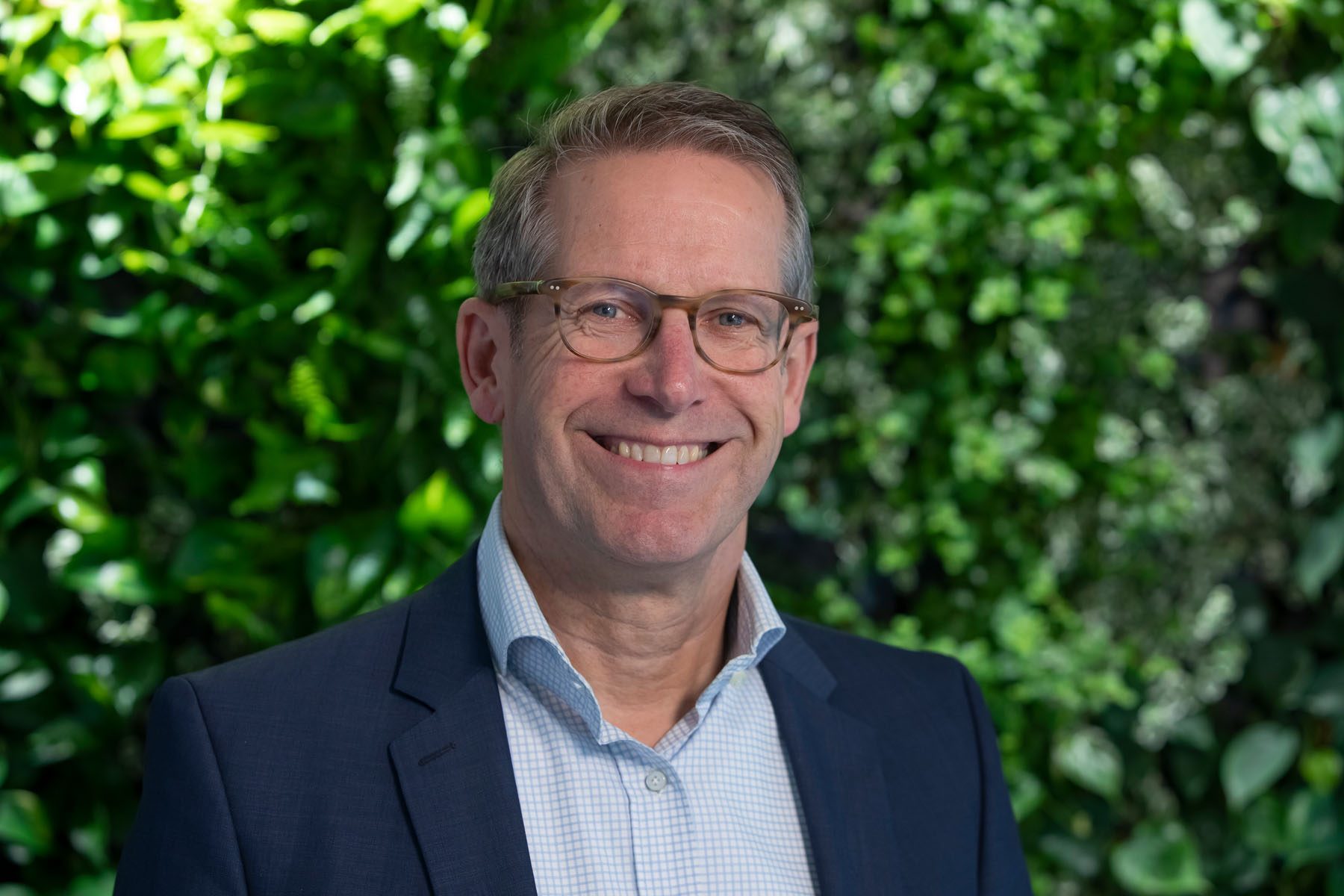
PRESS RELEASE
Thijs Starink new General Manager Nexstep
The Hague, 8 November 2022 – Thijs Starink has been appointed General Manager of Nexstep, the national platform dedicated to the reuse and decommissioning of (no longer used) oil and gas infrastructure. He has already fulfilled the position on an interim basis since the departure of Jacqueline Vaessen in July of this year. Starink will work for Nexstep two to three days a week, and he will also remain active as Senior Advisor E&P Assets for Energie Beheer Nederland (EBN).
Nexstep is a joint initiative of EBN and the Dutch oil and gas industry (united in Element NL) and has existed since 2017. The platform focuses mainly on an efficient and effective decommissioning of infrastructure that is no longer used. The aim is to reduce (social) costs through intensive cooperation between the oil and gas companies during decommissioning. In addition, Nexstep is committed to maintaining infrastructure that can play a role in the energy transition. In doing so, it works together with all possible parties involved and the government.
Menno Snel, chairman of Element NL and supervisory board member of Nexstep: “With the appointment of Thijs, we have brought in an experienced E&P manager with a proven track record. He knows the ropes and has an excellent network. For the phase in which Nexstep finds itself, lifting projects that serve the energy transition or reducing costs off the ground, he is the right man in the right place as far as we are concerned.”
Thijs Starink himself: “I am looking forward to this new role in a familiar, but still exciting and dynamic playing field. It is a challenge to get the many different parties that play a role or have an interest in the decommissioning to work well together. We are going to prepare infrastructure that is suitable for reuse for the energy transition. If this succeeds, it will be valuable for all involved and especially for Dutch society. It is great how my previous positions at the offshore contractor Allseas and at EBN now come together. That’s how I’m going to enthusiastically commit myself to connecting yesterday with today and tomorrow!”
Explanatory note: As a participant in oil and gas extraction for (usually) 40%, EBN also bears 40% of the costs of cleaning up. The remaining 60% of the costs are paid by the oil and gas companies, which are then allowed to enter this as operating costs and therefore have to pay less tax. As a result, the DUTCH State pays 73% of the total clean-up costs, 40% via EBN and the rest via lower tax payments. This explains why reducing clean-up costs is a social interest and why the national platform Nexstep was founded in 2017 on the initiative of EBN and Element NL. In addition to Element NL and EBN, the Ministry of Economic Affairs & Climate and the IRO (offshore contractors) are also represented as associated members, without voting rights. ___________________________________________________
For more information: Marcel Hoenderdos, 06-35120075
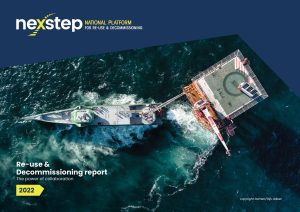
The fifth Re-use & Decommissioning report provides insight into the oil and gas infrastructure that is forecasted to be decommissioned in the Netherlands over the coming ten years and covers what has been decommissioned so far. The title of this report is “The Power of Collaboration”, since collaboration became the guiding principle for our activities within Nexstep.
Looking into the future, we once again see a slight shift of decommissioning. This can be explained by the difficult years of 2020 and 2021, with extremely low prices, the COVID-19 pandemic, and the problems with restrictions on emissions of nitrogen-based compounds which delayed or restricted decommissioning activities. We do however see a transformation in this pattern. In 2022 several decommissioning activities are taking place and we will highlight some of them in this report.
In this year’s report, we included interviews about the Joint Well Campaign as well as the Peer Assist which facilitates work sessions in which experienced decommissioning peers from various operators reacted to a planned decommissioning project, in order to improve it. Read about the achievements of five years Nexstep on the back of the hand-out.
Re-use & decommissioning report 2022 ENG
Re-use & decommissioning report ENG – handout
Re-use & decommissioning report NED – handout
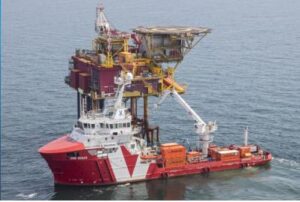
The 24th of April will mark the start of the execution phase of the Joint Well Campaign, a collaboration between operators NAM, Neptune Energy, ONE-Dyas, Petrogas E&P, TotalEnergies EP Nederland and Wintershall Noordzee. Bluestream Offshore B.V. as subcontractor of Oceaneering Services B.V. will execute the survey of 44 mud line suspension (MLS) wells with the VOS Sugar sailing from the Den Helder port for a 2-3 week period. This summer the next phase will be executed by cleaning and internal inspection of the top-part of the well conductors and the final decommissioning of the wells is planned for summer next year also using a vessel. This collaboration and the vessel-based execution method will give significant savings in the decommissioning cost of these MLS wells.
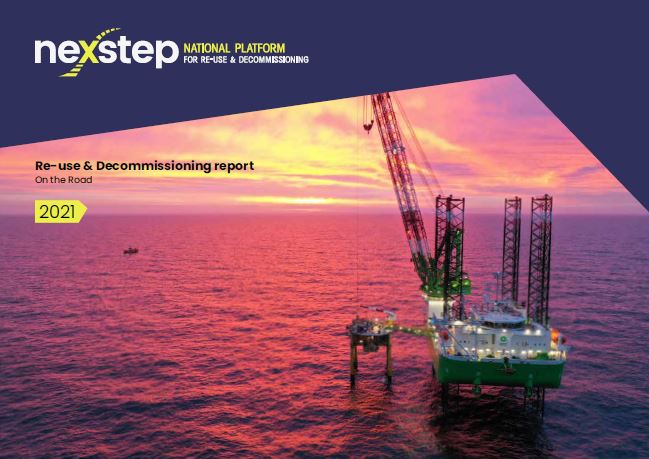
The fourth Re-use & Decommissioning report provides insight into the oil and gas infrastructure that is forecasted to be decommissioned in the Netherlands over the coming ten years and covers what has been decommissioned so far. The title of this report is “On the Road”, with a nod to our strategic program “Road to 30%”, but it also expresses that we are on the road to reach our aim of reducing decommissioning costs by 30%.
Last year, the offshore decommissioning activity was forecasted to be very low for 2021. The expected higher activity level forecasted in last year’s report for 2022 however, is now being postponed to 2023. Overall, when the forecasted decommissioning schedules of the 2018, 2019, 2020 and 2021 reports are compared, we see that the forecasted decommissioning has been delayed each year. Schedules are set up well in advance, which means that the window of operations can shift. Whether the timeframe can be met depends on several factors, and those factors could be different per offshore installation.
For onshore, the activity level in 2020 was marked with the start of a large campaign for well decommissioning associated with the end of production of the Groningen field by 2022.
In this year’s report, we included interviews with several operators in the Netherlands, focusing on decommissioning, on re-use and on the importance of producing gas from the North Sea. For the first time, we have added a fact sheet that compiles all the key information. Read the progress in our report and hand-out. Additional information about terminology can be found in our Glossary with icons.
Re-use & decommissioning report 2021 ENG
Re-use-decommissioning-report_glossary
Re-use & decommissioning report 2021 ENG_handout
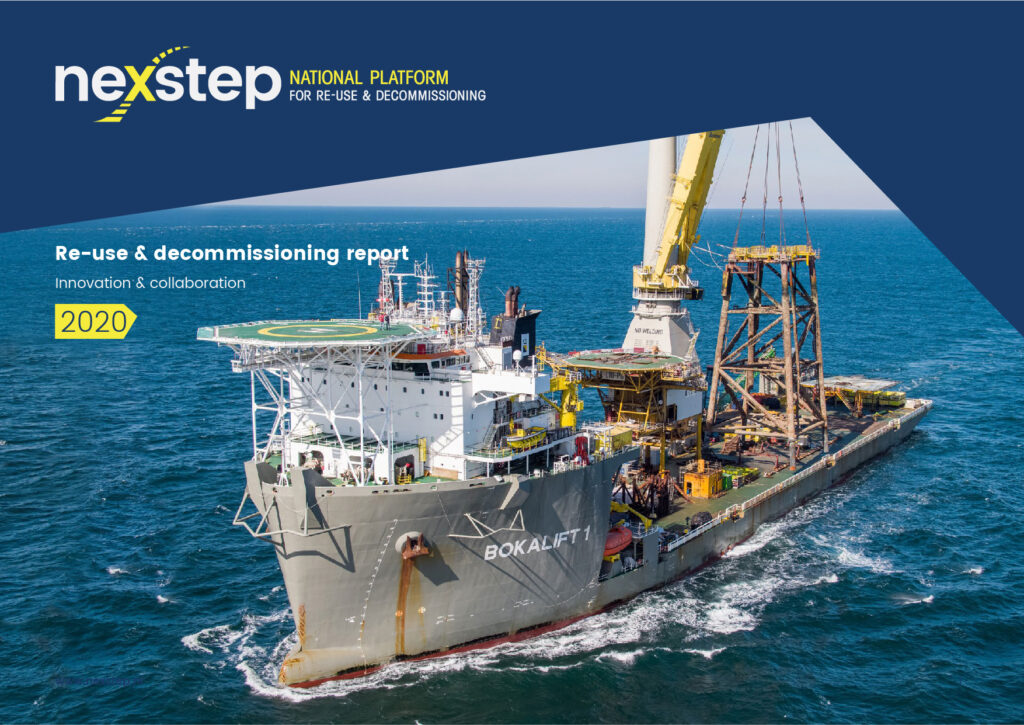 The third Re-use & decommissioning report provides insight into the expected oil and gas infrastructure that will be taken out of production in the Netherlands over the coming ten years and covers what has been done so far on the repurposing of the infrastructure.
The third Re-use & decommissioning report provides insight into the expected oil and gas infrastructure that will be taken out of production in the Netherlands over the coming ten years and covers what has been done so far on the repurposing of the infrastructure.
As forecasted last year, 2019 has proven to be a year with high activity. Last year, a total of ten platforms and three subsea installations had been forecasted to be removed. Due to a delay in the arrival of the crane vessel three satellite platforms which had been scheduled to be removed in 2018-2019 were actually removed early 2020.
Throughout this report you will find summaries of recent decommissioning projects. Read the progress in our report and hand-out. Additional information about terminology can be found in our Glossary with icons.
Re-use & decommissioning report 2020 ENG
Re-use-decommissioning-report_glossary
Re-use & decommissioning report 2020 ENG_handout
The second Re-use & decommissioning report outlines the status of in the decommissioning of the oil and gas infrastructure and the expectations for the next decade. Nexstep expects ten platforms to be removed from the North Sea this year. The first platform was removed in January 2019 and another will be relocated to be re-used for the second time. Furthermore three subsea installations are foreseen to be removed from the seabed.
Read the progress in our report and hand-out. Additional information about terminology can be found in our Glossary with icons. Finally, four interesting interviews about Nexstep and decommissioning in practice.
Re-use & decommissioning rapport 2019 ENG
Re-use & decommissioning rapport 2019 ENG_begrippenlijst met iconen
Re-use & decommissioning rapport 2019 ENG_interviews
Photo’s Re-use & decommissioning event 2019
During Offshore Energy 2018 in RAI Amsterdam, a hackathon was organised in cooperation with IRO. The aim of the hackathon was to capture thoughts and ideas from operators and the more than 50 supply chain contractors. NAM, Spirit Energy and Neptune Energy presented their challenges and dilemmas on offshore decommissioning and opened up to listen to solutions from the service industry. In three intensive sessions numerous ideas were generated, which are presented in this report.
We are now investigating to translate the ideas from the hackathon into concrete projects in close cooperation with the service industry.
Read the report here